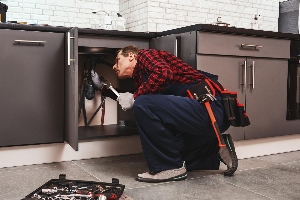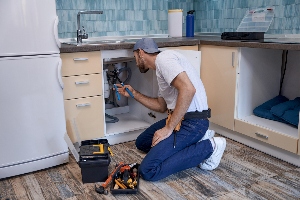When choosing between gas and electric water heaters, it's essential to weigh the decision based on your home's specific needs and preferences. Electric water heaters generally offer longer lifespans and can be more energy-efficient, potentially leading to long-term savings on energy bills. On the other hand, gas water heaters often provide faster heating and may be more effective for high-demand households.
Gas water heaters, which use natural gas or propane, can serve multiple fixtures simultaneously, making them suitable for larger families. Electric models, while typically more efficient, may have limitations in flow rate, making them better suited for smaller homes or where energy efficiency is a higher priority.
Understanding Water Heaters
Water heaters are essential for providing hot water in your home. Choosing between gas and electric models, along with understanding their operation and types, can significantly impact your energy efficiency and cost.
Types of Water Heaters
Tank Water Heaters: These are the most common type of water heaters, utilizing a storage tank that maintains a reservoir of hot water. Gas water heaters use natural gas or propane, while electric water heaters rely on electricity.
Tankless Water Heaters: Also known as on-demand water heaters, they heat water only when needed, providing energy efficiency. Gas-fired units heat water using burners, and electric models use heating elements.
Heat Pump Water Heaters: These are electric units known for their high efficiency. They use electricity to transfer heat from the air or ground to heat the water, which makes them more energy-efficient than traditional electric models.
How Water Heaters Operate
Tank Water Heaters: These units maintain a set volume of water at a specific temperature. Gas models ignite a burner below the tank, and electric models use heating elements within the tank.
Tankless Water Heaters: Water flows through a heat exchanger when a hot water tap is opened. Gas units use burners, providing rapid heating, while electric models use coils to heat the water quickly.
Heat Pump Water Heaters: These units extract heat from the surrounding air or ground and transfer it to the water using a compressor and evaporator. They typically consume less electricity compared to conventional electric models.
Energy Efficiency and Environmental Impact
When choosing between gas and electric water heaters, considering their energy efficiency and environmental impact is essential. Both types have their own benefits and drawbacks in these areas.
Comparing Energy Efficiency
Gas water heaters generally heat water faster than electric models. Traditional gas units have Efficiency Factor (EF) ratings between 0.60 and 0.70. On the other hand, electric heat pump water heaters can be more energy efficient, boasting EF ratings as high as 3.0, meaning they use three times less energy than they consume.
Electric water heaters tend to have EF ratings around 0.90 to 0.95. The Energy Star program sets standards for both types, ensuring they achieve high energy efficiency. It's critical to consider these ratings when deciding which is the best fit for your home, balancing energy savings with upfront costs and long-term benefits.
Choosing an efficient water heater can lead to significant energy savings over time and reduce your overall carbon footprint.
Environmental Considerations
Environmental impact is another important factor. Gas water heaters emit carbon dioxide, contributing to greenhouse gas emissions. Compliance with standards set by the California Air Resources Board (CARB) helps mitigate these emissions, but they still are a factor.
Electric models, while they don't produce direct emissions, depend on the electricity source. If your electricity comes from renewable energy, like wind or solar, the environmental impact is significantly lower. On-demand or tankless water heaters are another consideration as they avoid the standby energy loss of traditional storage tanks, making them more environmentally friendly.
Cost Implications
When deciding between gas and electric water heaters, understanding cost implications is crucial. This section focuses on initial purchase and installation, as well as operational and maintenance costs, highlighting significant factors relevant to your decision-making.
Initial Purchase and Installation
Gas Water Heaters: The initial purchase price for gas water heaters tends to be higher compared to electric models. Additionally, gas units require ventilation and gas line installation, which can further increase upfront costs. These factors should be considered when budgeting for your water heater.
Electric Water Heaters: Electric units generally have a lower purchase price and simpler installation requirements. They don't require gas lines or ventilation systems, resulting in lower installation costs. This makes them an attractive option if you're looking to minimize initial expenses.
Operational and Maintenance Costs
Gas Water Heaters: Gas units usually have lower operational costs because natural gas is typically cheaper than electricity. However, they may require more frequent maintenance and inspections to ensure safety and efficiency. Regularly checking for gas leaks and maintaining the venting system is crucial.
Electric Water Heaters: Electric models often have higher operational costs due to electricity prices. They are generally more energy-efficient, which can offset some of the operational expenses. Electric units typically require less maintenance, making them a convenient option for those preferring minimal upkeep.
Performance and Maintenance
Gas and electric water heaters differ in performance metrics like heating rates and recovery times. They also require distinct maintenance routines to ensure longevity and efficiency.
Heating Rates and Recovery Times
Gas water heaters generally have quicker heating rates and shorter recovery times due to their use of a gas burner, which can rapidly increase water temperature. This means your system can heat a large amount of water more quickly compared to electric heaters.
Electric water heaters typically have slower heating rates because they rely on heating elements, which gradually raise the water temperature. However, modern electric heat pump models tend to be more energy-efficient, with some having EF ratings as high as 3.0. This efficiency can offset slower heating times by reducing operational costs.
Required Maintenance
Both gas and electric water heaters require regular maintenance to perform optimally and extend their lifespan. For gas heaters, maintenance includes checking the gas valve and pilot light, inspecting the burner assembly, and ensuring proper ventilation. These steps help prevent issues such as gas leaks and inefficient combustion.
Electric heaters require different steps, such as periodic checks of the heating elements and thermostats, which are often located behind a panel on the side of the tank. Regularly flushing the tank to remove sediment buildup is crucial for both types, as it prevents efficiency loss and physical damage.
Safety and Convenience
When choosing between gas and electric water heaters, safety and convenience are key considerations. Gas water heaters present potential risks such as gas leaks and carbon monoxide, while electric models offer different conveniences.
Safety Features
Gas Water Heaters: Gas water heaters can pose risks such as gas leaks and carbon monoxide poisoning. A blocked vent can prevent proper exhaust, leading to toxic gas build-up. Modern gas heaters come with safety features like automatic shut-off valves and carbon monoxide detectors. Regular maintenance is critical to ensure these safety measures function effectively.
Electric Water Heaters: Electric models have fewer safety concerns. They eliminate risks associated with gas leaks and carbon monoxide. Safety measures focus on preventing electrical hazards. These include overheat protection and circuit breakers. Despite the lower risk, it is important to have professional installations and inspections.
Convenience Factors
Gas Water Heaters: Gas models heat water faster than electric ones, which can be more convenient for homes with high hot water demand. They remain operational during power outages, providing uninterrupted service. However, they require a properly vented space to ensure safety.
Electric Water Heaters: Electric heaters are generally easier to install and maintain. They do not need venting, making them an ideal choice for confined spaces. Modern electric heat pump water heaters are highly efficient, offering high energy savings. However, they rely on electricity, so they do not work during power outages.
Installation and Space Considerations
When choosing between gas and electric water heaters, it's essential to consider the space required and the complexity of the installation process. Each type demands distinct installation parameters, impacting space, permits, and utility connections.
Space Requirements
Gas Water Heaters:
Gas water heaters typically require more space due to the need for a flue or vent to expel combustion gases. If you opt for a traditional tank model, ensure there's adequate room for the tank and the venting system. Additionally, these units often need a natural gas line connection, which might not be available in all spaces.
Electric Water Heaters:
Electric water heaters, including heat pump types, generally occupy less physical space as they do not require venting. Tankless electric models offer further space-saving benefits by eliminating the need for a bulky tank. This makes them an ideal solution for smaller living areas where space is at a premium.
Installation Process
Gas Water Heaters:
Installing a gas water heater involves several steps that require professional expertise, such as connecting it to a natural gas line and installing a venting system. You should also obtain the necessary permits from local authorities. The complexity of this process means it is best handled by experienced plumbers, like those at One Call Plumbing, known for their reliable service in Greenville and Spartanburg.
Electric Water Heaters:
Electric water heaters have a simpler installation process since they only need an electrical connection. There is no need to install or retrofit a gas line or venting system, which can save you time and reduce installation costs. While the process is more straightforward, ensuring proper electrical configuration is critical, and the experts at One Call Plumbing can guarantee a seamless installation.
Pros and Cons of Gas and Electric Water Heaters
Choosing between a gas and electric water heater involves weighing various factors including cost, efficiency, maintenance, and installation.
Gas Water Heater
Pros:
- High Flow Rate: Gas water heaters can provide a higher flow rate, making them suitable for larger households.
- Quick Heating: They heat water faster, ensuring a quick supply of hot water.
Cons:
- Installation Complexity: Installing a gas water heater typically requires more complex venting and gas line work.
- Safety Concerns: They can pose risks like gas leaks and carbon monoxide poisoning.
- Higher Initial Cost: The upfront cost can be higher compared to electric models.
Electric Water Heater
Pros:
- Simplicity: Electric water heaters are easier to install and don’t require venting.
- Energy Efficiency: They can be more energy-efficient, with some models offering Energy Star ratings.
- Lower Initial Cost: Often, the initial cost is lower compared to gas models.
Cons:
- Slower Heating: Electric models generally heat water slower than gas models.
- Electrocution Risk: Improper installation or maintenance can pose risks of electrocution.
- Higher Operating Costs: Over time, the cost of electricity may make them more expensive to operate.
Choosing the Right Water Heater for Your Home
When selecting the right water heater, consider your household’s hot water demand, local energy sources and costs, and the benefits of tank versus tankless models. These factors will help guide your decision, ensuring you invest in a system that meets your needs and offers efficiency.
Assessing Your Hot Water Needs
Determine your daily hot water consumption to choose a water heater with an adequate capacity. Evaluate the peak usage times in your household, such as mornings and evenings when multiple family members shower or use hot water appliances simultaneously.
Consider the size and number of bathrooms, kitchen usage, and laundry needs. For larger homes, a high-efficiency gas water heater may be more suitable due to its quick recovery rate. Smaller homes or those with fewer occupants might benefit from a compact electric heater or an electric heat pump water heater for efficiency.
Estimating your family’s hot water requirements ensures you select a water heater that sufficiently meets demand without excessive energy consumption.
Considering Local Energy Sources and Costs
Investigate available energy sources in your region, including gas and electricity, and compare their costs. In areas where natural gas is readily available and less expensive, a gas water heater might offer lower operational costs. Conversely, electricity might be the better option in regions with lower electric rates or where renewable energy use is prevalent.
Consult your utility bills to understand current energy costs. In regions with fluctuating energy prices, an energy-efficient electric water heater can provide cost stability. Additionally, consider potential installation costs, such as running new gas lines or upgrading electrical systems.
Choosing an energy source that aligns with your local costs can significantly impact your water heater’s long-term affordability.
Deciding Between Tank and Tankless
Evaluate the advantages and disadvantages of tank and tankless water heaters. Traditional tank water heaters store a large volume of hot water, making them ideal for high-demand households. However, they can be less energy-efficient due to heat loss.
Tankless water heaters, on the other hand, provide hot water on demand, reducing energy use and offering endless hot water supply. They are compact, saving space, and may qualify for energy rebates, but initially cost more than tank models.
Contact us to chat about your options.












